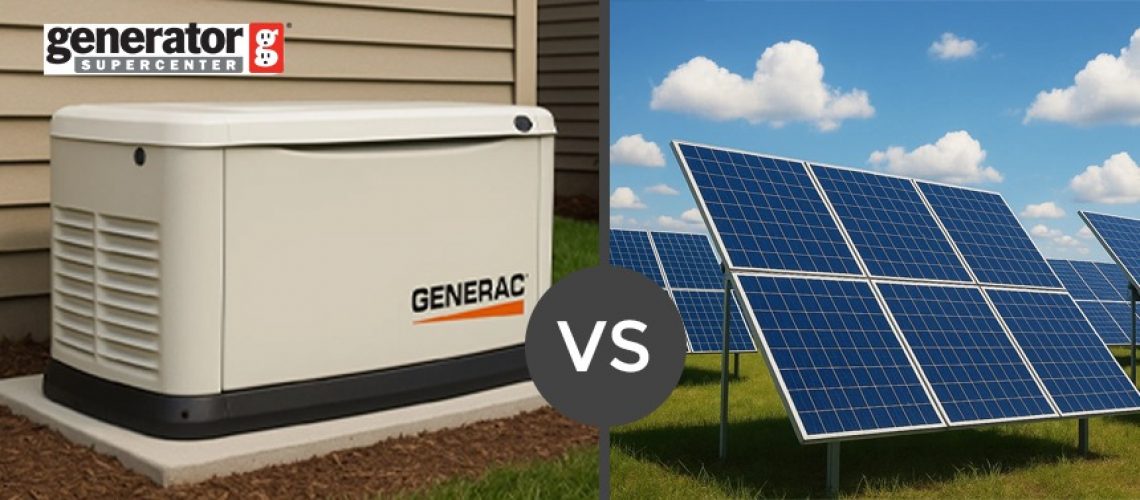When the lights go out—whether due to wildfires, rolling blackouts, or unexpected grid failures—homeowners are left with one key question: How do I keep my home powered and my family safe?
Two popular backup power solutions are whole home standby generators and solar panel systems with battery storage. While both offer some level of energy independence, they’re fundamentally different in how they operate, what they cost, and how reliably they perform in emergencies. Let’s break down the pros, cons, and real-world considerations to help you make an informed decision.
What Is a Whole Home Standby Generator?
A whole home standby generator is a permanently installed system connected to your home’s electrical panel and fueled by natural gas or propane. When the power goes out, it automatically turns on within seconds and can power your entire home—including appliances, HVAC, lights, and medical equipment.
Key Benefits:
- Automatic Activation: No manual setup—power restores instantly.
- Full Home Coverage: Can run everything, including heavy-load items like air conditioning and electric stoves.
- Runs for Days: As long as there’s fuel, you’ll have power indefinitely.
- Cost-Effective vs. Battery Banks: Lower upfront cost per kWh of backup power.
Things to Consider:
- Requires a fuel source (natural gas or propane).
- Routine maintenance is needed.
- Installation may require permits and adherence to local setback rules.
What About Solar Panels with Battery Storage?
Solar panels combined with battery storage systems (like Tesla Powerwall or Generac PWRcell) allow you to store excess solar energy and use it during outages.
Key Benefits:
- Clean Energy: Solar is renewable and environmentally friendly.
- Utility Bill Savings: Lower electric bills over time with net metering.
- Minimal Maintenance: Fewer moving parts than generators.
Things to Consider:
- Limited Backup Capacity: Most residential batteries can only support a few essential loads for a limited time (often 4–12 hours depending on usage).
- Weather Dependent: Cloudy days = less power. If the grid is down and the sun isn’t shining, you’re out of luck.
- Higher Initial Costs: Especially when including multiple battery units for whole-home backup.
- Delayed ROI: Payback period is often 10–15 years, longer if used primarily for backup.
Real-Life Comparison: Generator vs. Solar for Backup
| Feature | Whole Home Generator | Solar + Battery Storage |
| Startup Time | 10–30 seconds (automatic) | Instant (battery-dependent) |
| Power Capacity | Full-home | Limited, unless multiple batteries |
| Works During Grid Outage? | Yes | Yes (with battery), but not solar-only |
| Weather Independent? | Yes | No |
| Maintenance | Periodic servicing | Minimal |
| Upfront Cost | $$ (Less than solar + battery) | $$$$ |
| Lifespan | 10–15 years (engine-based) | 25+ years (panels), 10–15 years (battery) |
Which Is Better for You?
- Choose a standby generator if:
You want reliable, uninterrupted power for your entire home—especially critical for homes with medical equipment, young children, or remote workers. - Choose solar with battery backup if:
You’re looking for long-term energy savings, care deeply about sustainability, and only need limited backup for short outages.
Why Not Both?
For the ultimate in energy security, some homeowners are now installing both: solar panels for everyday savings, and a standby generator for emergencies when solar and batteries fall short. This hybrid solution maximizes both reliability and eco-efficiency.
Final Thoughts
Power outages are no longer rare events—they’re becoming the new normal, especially in states like California and Texas. Whether you’re protecting your home from rolling blackouts or safeguarding your family during a storm, having a dependable backup power plan is essential.
Still not sure which solution fits your needs?
Contact us today to speak with a licensed generator specialist who can evaluate your home’s layout, power needs, and outage risks to help you choose the right standby generator for reliable backup power


